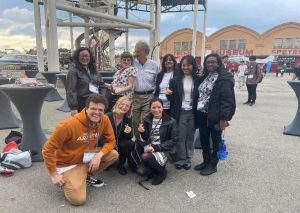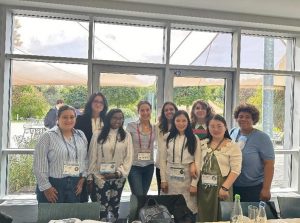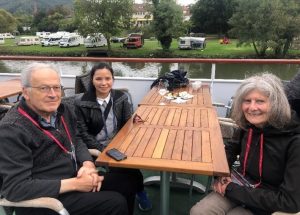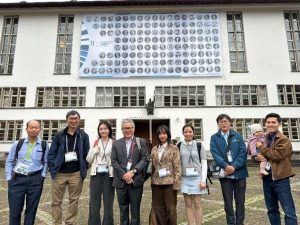Lien Thuy Nguyen
RMIT University
11th Heidelberg Laureate Forum Report
I had the honour of being one of the 200 young researchers from over 50 different countries selected to attend the 11th Heidelberg Laureate Forum (HLF). This prestigious event, held in Heidelberg, Germany, serves as a unique platform where young researchers can engage with laureates from the fields of mathematics and computer science, including Fields Medalists, Abel Prize recipients, and ACM A.M. Turing Award winners.
The forum’s schedule was packed with enriching activities, including panel discussions and illuminating talks delivered by the laureates. Among the many memorable talks, one that particularly stood out to me was by Raj Reddy, the recipient of the 1994 ACM A.M. Turing Award. His talk, titled “The Promise and Perils of AI,” delved into both the transformative potential and the ethical challenges of AI. He thoughtfully proposed strategies for harnessing AI to improve human life, while also addressing its risks, offering a balanced and insightful perspective on how we might shape the future of this powerful technology.
The forum also offered numerous opportunities for informal interactions with the laureates, a feature that made the event truly special. During coffee breaks, lunches, or dinners, we had the chance to engage in casual conversations—not only about research but also about personal experiences and the human side of academia. This relaxed atmosphere fostered discussions that extended beyond academic achievements and allowed for meaningful personal connections.
Figure 1: A group picture with Dennis Parnell Sullivan (Abel Prize 2022) and his wife.
One of the most enriching aspects of the forum was the chance to interact with two remarkable women: Yael Tauman Kalai, recipient of the ACM Prize in Computing (2022), and Moira Chas, professor in the Mathematics Department at Stony Brook University. Their stories of balancing academic responsibilities, family life, and research were both inspiring and instructive, offering valuable insights into managing my own journey.
Figure 2: A group picture with Yael Tauman Kalai (ACM Prize in Computing 2022)
Beyond the academic content, the forum included entertaining social events such as a boat ride along the Neckar River, a Bavarian night, a visit to Heidelberg Castle, and city tours. These experiences blended cultural immersion with networking. Throughout the week, I had the opportunity to meet many talented young researchers from various fields, and the HLF provided the perfect environment to foster collaborations and lifelong connections.
Figure 3: A picture with Leslie G. Valiant (ACM A.M. Turing Award 2010) and his wife.
Where are you in your career?
I am currently a third-year PhD student in Mathematics at RMIT University, Australia.
Why did you want to attend the HLF?
I wanted to attend the HLF because it offers an exceptional opportunity to engage with the most influential mathematicians and computer scientists globally. This unique experience will undoubtedly broaden my perspective on the current trends and future directions of research in my field.
Tell us about your research.
My research focuses on creating innovative dynamic approaches and novel techniques for solving complex optimisation problems in data science and machine learning. I aim to develop algorithms that achieve faster convergence and higher accuracy, particularly in nonconvex and large-scale settings.
What are you favourite application of your work?
One of my favourite applications of my work is developing new fast algorithms for matrix factorisation, particularly in recommendation systems. These algorithms enhance the efficiency and accuracy of predicting user preferences, leading to more personalised recommendations. Furthermore, my work on optimising multi-class logistic regression helps tackle classification challenges in machine learning, providing more efficient and accurate solutions for complex realworld applications.
If you could meet any Fields Medalist or Abel Prize winner which would it be and why?
If I could meet any Fields Medalist, I would choose Pierre-Louis Lions for his groundbreaking work on viscosity solutions of partial differential equations. His contributions have had a lasting impact on mathematical analysis, particularly in optimal control theory and game theory. I’m fascinated by how his research connects deep theoretical insights with real-world applications, and I would love to discuss how his methods can be applied to contemporary challenges in optimisation and applied mathematics.
Figure 4: A group picture with Bảo Châu Ngô (Fields Medal 2010).




